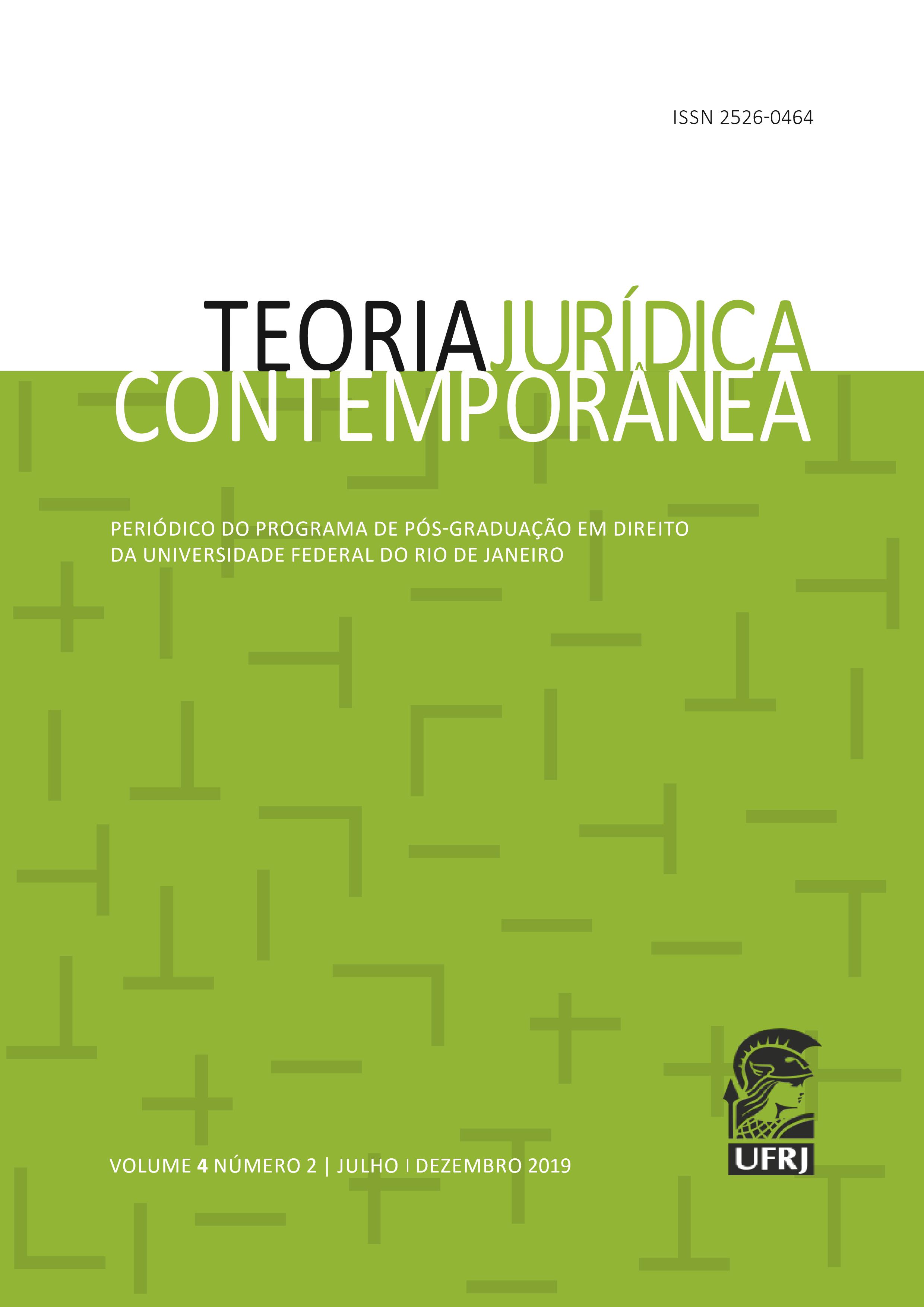Reforma Trabalhista: tentativa de clausura hermenêutica na nova redação do art. 8º da CLT
DOI:
https://doi.org/10.21875/tjc.v4i2.24159Abstract
RESUMO:
O presente artigo realiza um cotejo das alterações hermenêuticas contidas na reforma da CLT com as mudanças da teoria do direito do último século para demonstrar que os caminhos tomados pela CLT reformada estão na contramão da ciência jurídica. Para tanto, foram verificados (i) a localização do Direito do Trabalho na ciência jurídica; (ii) o alcance da separação entre direito público e direito privado na atualidade; (iii) o perfil legalista e positivista da CLT reformada; e (iv) o papel do Poder Judiciário na efetivação de direitos sociais fundamentais. Conclui-se pela inadequação da alteração inserida no artigo 8º da CLT, que pretende promover uma clausura hermenêutica no âmbito do Direito do Trabalho
ABSTRACT:
This article makes a confrontation of the hermeneutic changes contained in the labor reform bill and the changes in theory of law of the last century to demonstrate that the paths taken in said reform are contradictory to the Legal Sciences. Therefore, we verified (i) the location of Labor Law in the legal sciences; (ii) the scope of the separation between public law and private law at the present; (iii) the legalist and positivist profile of the reformed Labor Bill; and (iv) the role of the Judiciary in the implementation of fundamental social rights. It is concluded by the inadequacy of the amendment inserted in article 8 of the CLT, which intends to promote a hermeneutical closure in the scope of Labor Law.
References
BOCHENEK, Antônio César. A interação entre tribunais e democracia por meio do acesso aos direitos e à justiça: análise de experiências dos juizados especiais federais cíveis brasileiros. Brasília: Conselho da Justiça Federal, 2013.
BRITO, Laura Souza Lima e. Lógica e Direitos Humanos. Rio de Janeiro: Lumen Juris, 2016.
DELGADO, Maurício Godinho; DELGADO, Gabriela Neves. A reforma trabalhista no Brasil – com os comentários à Lei n. 13.467/2017. São Paulo: LTr, 2017.
DO COUTO E SILVA, C. V. A obrigação como processo. São Paulo: Editora Jurídica José Bushatsky LTDA, 1976.
GARCIA, Gustavo Filipe Barbosa. Introdução ao estudo do direito: teoria geral do direito. Rio de Janeiro: São Paulo: Método, 2009.
_____. Reforma trabalhista – análise crítica da Lei 13.467/2017. 2ª ed., rev., ampl. e atual., Salvador: Juspodivm, 2017.
GONZÁLEZ, Ana Lúcia Stumpf. Do Processo do Trabalho, p. 249-280, in: ZIMMERMANN, Cirlene Luiza. Reforma Trabalhista Interpretada – Lei nº 13.467/2017. Caxias do Sul: Plenum, 2017.
LORA, Ilse Marcelina Bernardi; DIAS, Sandra Mara de Oliveira. Inconstitucionalidade da restrição legal imposta pela Reforma Trabalhista na análise das normas coletivas pela Justiça do Trabalho, pp. 25-30, in:
DALLEGRAVE NETO, José Affonso; KAJOTA, Ernani (Coord.). Reforma Trabalhista ponto a ponto – Estudos em homenagem ao Professor Luiz Eduardo Gunther. São Paulo: LTr, 2018.
RAMOS, André de Carvalho; GRAMSTRUP, Erick Frederico. Comentários à Lei de Introdução às Normas do Direito Brasileiro. São Paulo: Saraiva, 2016. RAMOS, André de Carvalho. Manual do Poder Judiciário brasileiro. São Paulo: Saraiva, 2016. REIS, Daniela Muradas. O princípio da vedação do retrocesso no Direito do Trabalho. São Paulo: LTr, 2010.
REALE, Miguel. Lições preliminares de direito. 27ª ed. São Paulo, Saraiva, 2002.
SILVA, Homero Batista Mateus da. Comentários à Reforma Trabalhista – análise da Lei 13.467/2017 – artigo por artigo, 2ª ed., rev. e atual., São Paulo: Revista dos Tribunais, 2017.
SEVERO, Valdete Souto. A hermenêutica trabalhistas e o princípio do Direito do Trabalho, p. 29-46, in: SOUTO MAIOR, Jorge Luiz; SEVERO, Valdete Souto (coords.). Resistência: aportes teóricos contra o retrocesso trabalhista. São Paulo: Expressão Popular, 2017.
SOUTO MAIOR, Jorge Luiz; Curso de Direito do Trabalho: Teoria Geral do Direito do Trabalho, vol. I – Parte I. São Paulo: LTr, 2011.
_____. SEVERO, Valdete Souto. O Processo do Trabalho como instrumento do Direito do Trabalho e as ideias fora de lugar no novo CPC. São Paulo: LTr, 2015.
Downloads
Published
Issue
Section
License
The authors who publish in this journal agree with the following terms:
1. The authors maintain the copyright and grant the journal the right of first publication, with the work simultaneously licensed under the Creative Commons Attribution License that allows the sharing of the work with recognition of authorship and initial publication in this journal.
2. Authors are allowed to assume additional contracts separately, for non-exclusive distribution of the version of the work published in this journal (e.g., publishing in an institutional repository or as a book chapter), with acknowledgment of authorship and initial publication in this journal.
3. Authors are allowed and encouraged to publish and distribute their work online (e.g., in institutional repositories or as a personal page) at any point before or during the editorial process, as this may generate productive changes, as well as increase the impact and citation of the published work (See The Effect of Open Access).

This work is licensed under a Creative Commons Attribution-ShareAlike 3.0 Brazil License.

